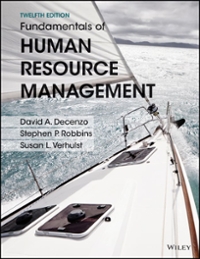Why would a labor dispute cause the Easter Bunny to arrive empty handed for U.S. children and
Question:
Why would a labor dispute cause the Easter Bunny to arrive empty handed for U.S. children and McDonald’s to ration French fries in Japan? The not‐so‐simple answer is the ripple effect that economic strikes have on an increasingly global economy.
We know that strikes and lockouts hurt workers and employers. They are the players on the front lines of any labor dispute, but a dispute between the union between West Coast dockworkers and the shipping companies they work for in 2015 spilled over into many other sectors of the economy. The list of affected businesses is long and includes production cuts at U.S. Honda factories because they ran out of necessary parts, shortages of holiday baskets and toys for Easter, agricultural products like potatoes waiting to be shipped to Asian ports rotting in U.S. docks, and retailers losing sales because imported books, clothing, and furniture were stuck on ships that could not be unloaded.
Dockworkers in 29 West Coast ports had worked without a contract for 8 months by the time U.S. Labor Secretary Tom Perez arrived in San Francisco with orders from President Obama to get the strike resolved immediately. Negotiations between the union and shipping companies on wages and benefits moved quickly, but stalled on issues regarding arbitration of disputes. Rather than go on strike, dockworkers, also called longshoremen, started working very slowly and restricted the number of skilled crane operators available to operate the gigantic cranes that unload containers from the ships and railcars. The shipping companies were also accused of slowing the process by limiting the number of truck beds available to move containers and limiting the number of crews they called to load and unload ships.
Federal mediators weren’t able to broker an agreement, and the President wasn’t able to invoke his powers under Taft–Hartley until a strike or lockout was involved. Slowdowns don’t count. In 2002, President George W. Bush was able to force West Coast ports to open during a similar labor dispute after employers locked the dockworkers out for 10 days. Growing pressure from the agriculture industry, retail industry, and the President ultimately led the parties to an agreement.
The National Retail Federation issued a statement applauding the agreement but warning “As we welcome today’s news, we must dedicate ourselves to finding a new way to ensure that this nightmare scenario is not repeated again,” the association said. “If we are to truly have modern international trade, supply chain and transportation systems, we must develop a better process for contract negotiations moving forward.”
Questions:
1. How might labor disputes change if the Taft–Hartley Act is changed to allow the President to intervene in labor disputes that have not resulted in lockouts or strikes? What criteria should determine whether the President or other governing group can take over labor negotiations?
2. Examine the “unfair labor practices” explained in the chapter. Discuss whether slowdowns should qualify as unfair labor practices like wildcat strikes.
3. Research: Look for other examples of labor disputes that affected the local, national, or global economy. Explain the situations, effects, and how they were resolved.
Step by Step Answer:

Fundamentals Of Human Resource Management
ISBN: 9781119032748
12th Edition
Authors: David A DeCenzo, Stephen P Robbins, Susan L Verhulst





